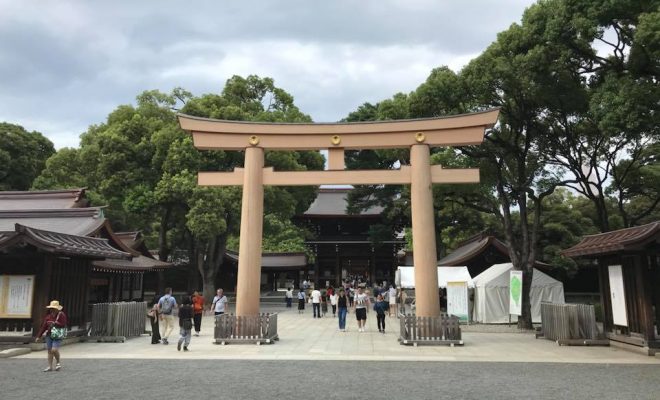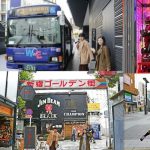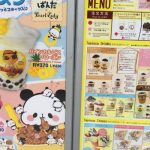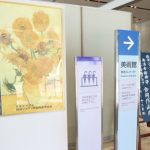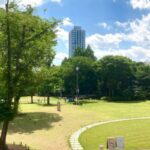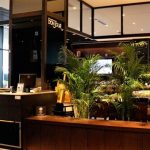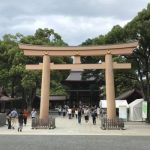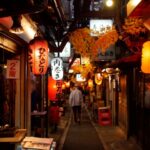What is Meiji Jingu Shrine? A Spiritual and Natural Oasis in the Heart of Tokyo
Established in 1920, Meiji Jingu Shrine is one of Japan’s most renowned shrines, located right behind JR Harajuku Station in the very center of Tokyo. Despite its urban setting, it is surrounded by a vast forest covering approximately 700,000 square meters.
Once you step through the large torii gate, you will find yourself surrounded by about 100,000 trees from more than 200 species. As you walk along the tree-lined paths, the city’s hustle and bustle gradually fades away, leaving you immersed in a peaceful, natural atmosphere.
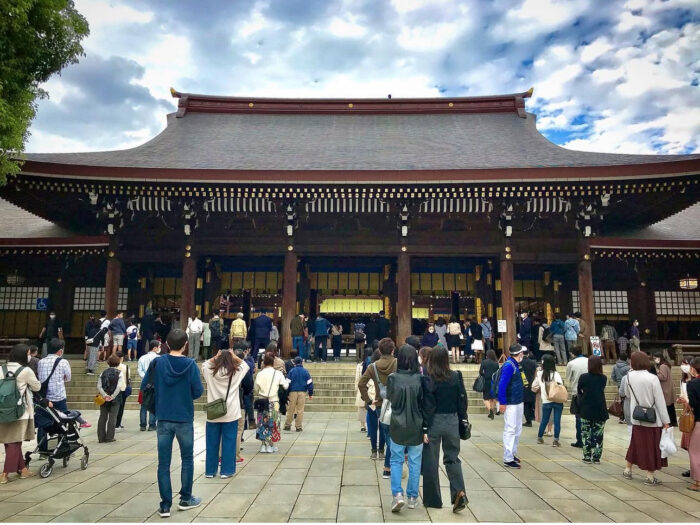
Meiji Jingu Main Shrine
The shrine enshrines Emperor Meiji and Empress Shoken, key figures of the Meiji era. Their close relationship symbolizes marital harmony, and they are worshipped as deities who bring blessings for love, family safety, and happiness at home.
Visitors come throughout the year to pray for good health, academic success, protection, and good fortune. During the first three days of the New Year, the shrine attracts over three million visitors, making it one of Japan’s most famous power spots.
The current main hall, originally built in 1920, was reconstructed in 1958 after being destroyed during World War II. Using Japanese cypress, the design harmonizes beautifully with the forest, offering visitors a solemn and respectful atmosphere.
Meiji Jingu is also a place to celebrate life’s milestones. On Coming of Age Day and during Shichi-Go-San (a festival for children), many visitors dress in colorful traditional kimonos, filling the grounds with festive and heartwarming scenes.
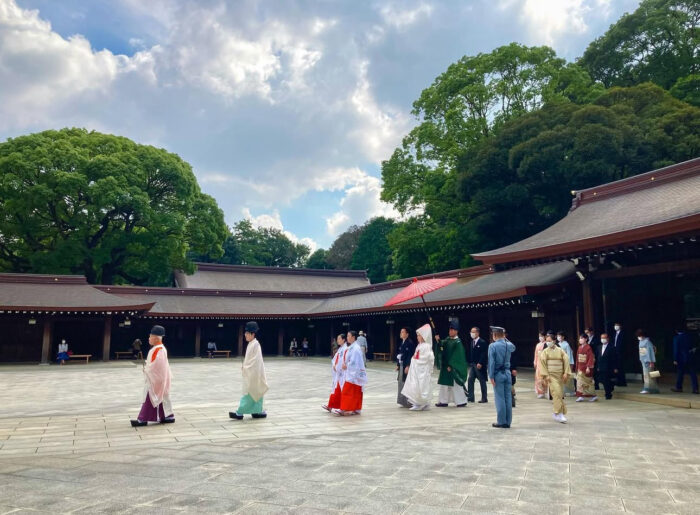
The shrine is also well known for its traditional Shinto weddings. Ceremonies are held at Hosaiden Hall, and include a beautiful procession called Sanshin, where the bride and groom walk through the sacred grounds guided by priests and shrine maidens. This iconic ritual showcases the beauty of Japanese wedding traditions.
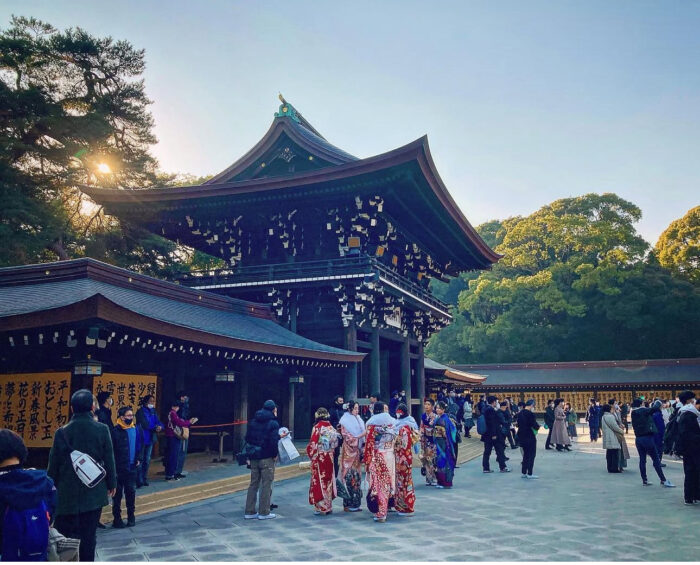
Meiji Jingu Wedding Ceremony
Discover History and Culture at Meiji Jingu Museum
When visiting Meiji Jingu, don’t miss the Meiji Jingu Museum, located within the shrine grounds.
Opened in 2019 to celebrate the shrine’s 100th anniversary, the museum was designed by renowned architect Kengo Kuma. The wooden structure blends naturally into the surrounding forest, offering a relaxing and harmonious atmosphere.
Inside, visitors can view precious items connected to Emperor Meiji and Empress Shoken, as well as cultural artifacts and treasures from the Meiji era.
Special exhibitions are held throughout the year, giving visitors fresh and unique experiences every time they visit.
Opening Hours: 10:00–16:30 (Last entry: 16:00)
Closed on Thursdays (open if a public holiday) and during exhibition changes
Admission: Adults: 1,000 yen / High school and younger: 900 yen / Children (under elementary school age): Free
Meiji Jingu Gyoen: A Serene Garden in the Middle of the City
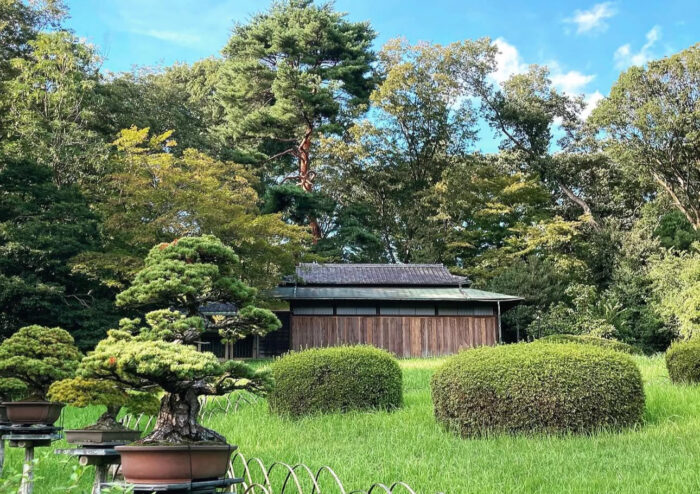
gyoen Kakuun-tei
Located on the south side of the shrine, Meiji Jingu Gyoen Garden is an 83,000-square-meter garden that offers surprising tranquility right in the middle of Tokyo. Dating back to the Edo period, it was originally the residence garden of feudal lords like the Kato and Ii families. Later, it became a walking garden for Empress Shoken and a key reason why Meiji Jingu was built in Yoyogi.
Kiyomasa Well: A Natural Power Spot
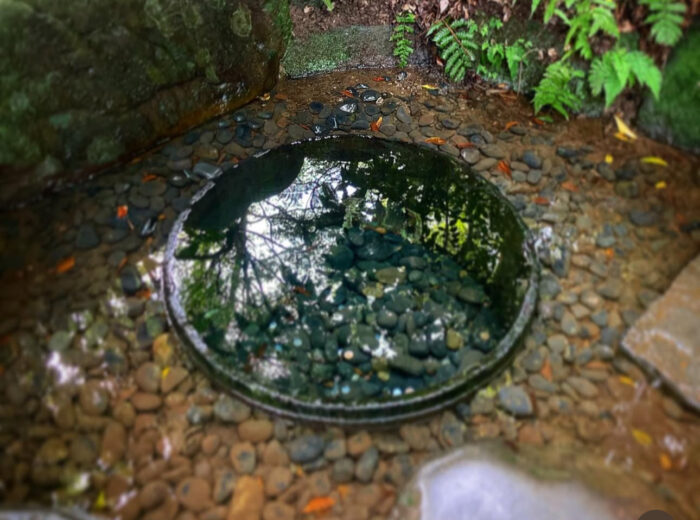
Meiji Jingu Gyoen Kiyomasa Well
Hidden deep in the garden is Kiyomasa Well, said to have been dug by famous samurai Kato Kiyomasa. The well constantly releases around 60 liters of fresh spring water per minute, and is considered a spiritual spot that purifies visitors’ minds and bodies.
Iris Garden: A Popular Early Summer Destination
The Iris Garden was designed for Empress Shoken and features about 1,500 irises. During early summer, the garden is beautifully colored with purple, white, and pink blooms, drawing visitors and photographers alike.
Kakuun-tei: A Peaceful Teahouse in the Garden
The Kakuun-tei teahouse was built for Empress Shoken. Although it was destroyed during the war, it was later rebuilt and continues to offer visitors a quiet and peaceful place to rest within the garden’s natural beauty.
Seasonal Beauty and Birdwatching
Throughout the year, the garden features various seasonal flowers and attracts many species of birds, including kingfishers. From spring blossoms to autumn leaves, it offers visitors a chance to enjoy nature in every season.
Opening Hours:
March–October: 9:00–16:30
November–February: 9:00–16:00
June: 8:00–17:00 (until 18:00 on
Enjoy Yoyogi Park Next to Meiji Jingu
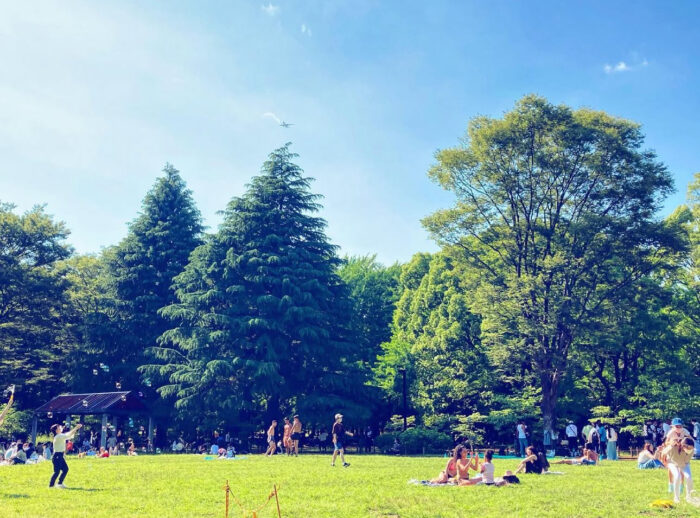
A green oasis near Meiji Jingu Shrine
Right next to Meiji Jingu Shrine lies Yoyogi Park, one of Tokyo’s most famous and spacious urban parks. Originally developed as the site of the Olympic Village, it is now loved by locals and tourists alike as a relaxing spot for jogging, cycling, picnics, and dog walking.
After visiting Meiji Jingu, taking a leisurely stroll through Yoyogi Park is highly recommended. You can enjoy seasonal beauty such as cherry blossoms in spring, colorful foliage in autumn, and the wide open lawns, which offer a refreshing escape from the busy city.
Location: 2-1 Yoyogi Kamizono-cho, Shibuya-ku, Tokyo
Open: 24 hours
*Some facilities may be closed during New Year holidays
Admission: Free (Some facilities may charge fees)
Refresh Your Body and Soul at Meiji Jingu and Yoyogi Park
Begin your day by experiencing the sacred atmosphere of Meiji Jingu Shrine, surrounded by nature and rich history. Take time to visit the Meiji Jingu Museum, where artifacts and exhibits related to Emperor Meiji and Empress Shoken offer deep insight into Japanese culture.
Afterward, head to the adjacent Yoyogi Park to relax among wide green spaces and enjoy the beauty of nature throughout the seasons.
With spiritual moments, peaceful gardens, and cultural experiences all in one area, Meiji Jingu and Yoyogi Park together offer a rare opportunity to refresh both mind and body while staying in the heart of Tokyo. Don’t miss this perfect urban escape.
Learn How to Visit a Shrine Properly:
■ How to Visit a Shinto Shrine: Proper Etiquette and Steps
■ Top 13 Shrines in Shinjuku — Explore Their History and Culture
■Cafe Mori No Terrace
(YOKOSO Shinjuku Editorial Team)
Information
| Name | Meiji Shrine (明治神宮) |
| Address | 1-1 Yoyogikamizonocho, Shibuya-ku, Tokyo |
| TEL | 03-3379-5511 |
| Open Time | opens with sunrise and closes with sunset, the opening hours change every month |
| Closed | None |
| Access | 9min from “Sangubashi Station” 10min from JR “Yoyogi Station” A1 exit 12min from JR “Harajuku Station” Omotesando exit |
Access Map

